
"A fact is a simple statement that everyone believes. It is innocent, unless found guilty.
A hypothesis is a novel suggestion that no one wants to believe. It is guilty, until found effective."
---Edward Teller
Crop
circles were not known prior to 1970, apart from the one reported
exception of the Tully, Australia Saucer Nest of 1966. Crop circles
first appeared in the UK in the 1970's, starting with simple circular
patterns and developing over time into huge and complex geometric
formations. In 1991 two elderly landscape painters named Doug Bower and
Dave Chorley confessed that they had been making crop circles in English
grain fields since the 1970's after reading about the Tully, Australia
Saucer Nest of 1966. The pair demonstrated how they did it for a film
crew and told how they had devised the idea over a pint or two at their
local pub. It would appear that the Tully, Australia Saucer Nest of 1966
is the earliest reported crop circle, although it is not what may be
recognised today as a typical crop circle.
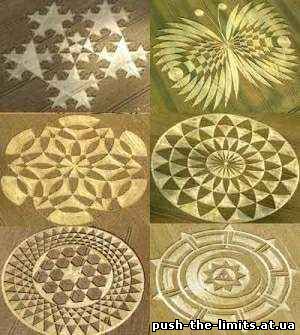
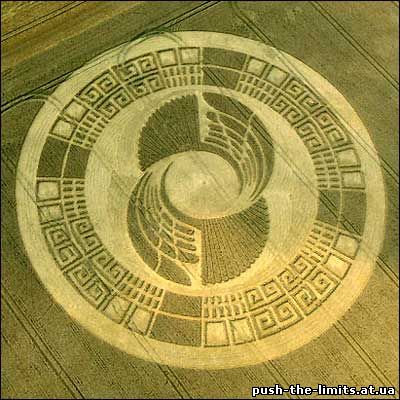
These are some of the rare and astonishing crop circles.
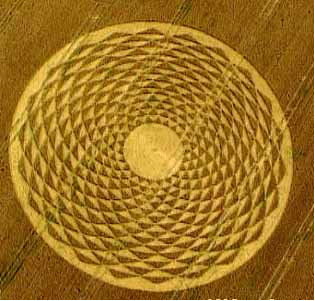
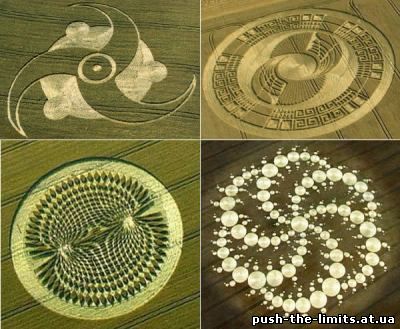
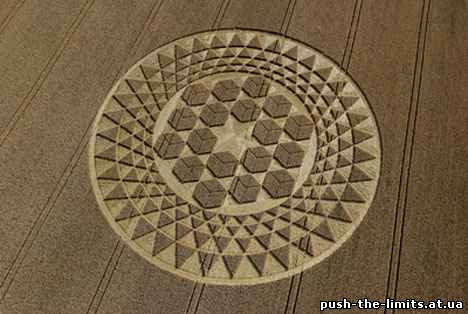
What is the Tully Saucer Nest story?
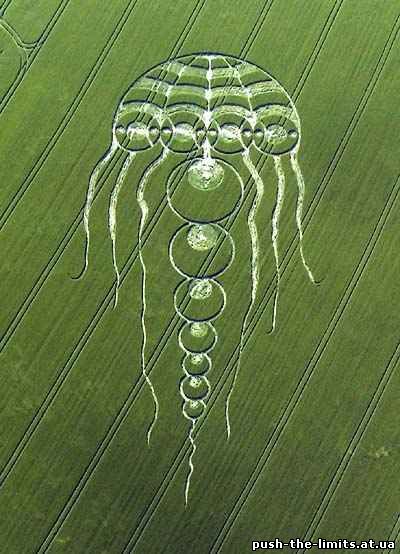
The following article is from http://ufos.about.com (August 2003). This is it, where it all started:
"At 9:00 am on January 19, 1966, a calm sunny day, a 28 year old banana farmer named George Pedley was driving a tractor near Horseshoe Lagoon on the property of Albert Pennisi, near Tully, in tropical far north Queensland, Australia. When he was about 25 yards from the lagoon, he heard a loud hissing sound above the noise of the tractor. Suddenly, an object rose out of the swamp. When I glanced at it, it was already 30 feet above the ground, and at about tree-top level. It was a large, grey, saucer-shaped object, convex on the top and bottom and measured some 25 feet across and 9 feet high. While I watched, it rose another 30 feet, spinning very fast, then it made a shallow dive and took off with tremendous speed. Climbing at an angle of 45 degrees it disappeared within seconds in a south-westerly direction.
"At 9:00 am on January 19, 1966, a calm sunny day, a 28 year old banana farmer named George Pedley was driving a tractor near Horseshoe Lagoon on the property of Albert Pennisi, near Tully, in tropical far north Queensland, Australia. When he was about 25 yards from the lagoon, he heard a loud hissing sound above the noise of the tractor. Suddenly, an object rose out of the swamp. When I glanced at it, it was already 30 feet above the ground, and at about tree-top level. It was a large, grey, saucer-shaped object, convex on the top and bottom and measured some 25 feet across and 9 feet high. While I watched, it rose another 30 feet, spinning very fast, then it made a shallow dive and took off with tremendous speed. Climbing at an angle of 45 degrees it disappeared within seconds in a south-westerly direction.

Another
surprise came when Pedley rounded the bend of the road and came to the
spot from which the object had risen. There in the lagoon was a large
circular area that was clear of reeds and in which the water was
rotating slowly. It had not been like that three hours earlier when he
had passed the lagoon. After looking around, he got back on the tractor
and left.A few hours later, at about noon, Pedley returned to the lagoon
for a second look. The scene had changed, because now the circular area
was covered by a floating mass of green reeds that were distributed in a
clockwise radial pattern. The circular mass of reeds was about 30 feet
in diameter.Pedley was by now excited enough about what he was seeing to
go and tell Albert Pennisi, the owner of the sugar cane farm land on
which the lagoon was located, and another friend. Pennesi recalled that
his dog had acted strangely that morning, barking madly and heading off
toward the lagoon at about 5:30 am. Pennisi and the other man were
amazed by the circular mass of reeds. Wading out to the mass, they found
that they could swim under the mass of reeds and that the lagoon floor
beneath it was smooth and showed no traces of roots. Oddly, the outside
edges of the mass of reeds angled down, similar to the shape of a saucer
placed face down. Pennisi went and got his camera and took photographs
of the mass of reeds, which was now beginning to turn brown on its top
surface. George Pedley reported his experience to the Tully police that
evening, and they in turn reported it to the RAAF after making a trip to
the site the next day, January 20.
Within
days, the media had picked up the event and the area was filled with
investigators, many of whom were trying to prove theories as to the
cause of the "nest" such as helicopters, big birds, crocodiles,
reed-eating grubs, and whirlwinds of one sort or another. Pedley's UFO
sighting was all but overlooked in the flurry of explanations. During
the course of the investigations, as many as five other "nests", all
smaller than the original, were discovered. In some of these, the reeds
were rotated in a counter-clockwise direction and a couple of them
showed signs of burning in the center of the nest. Samples of the
original nest were sent to Brisbane for analysis, but nothing unusual
was detected. Other than being part of the "nest", the only unusual
thing about the reeds was that they turned brown in about 8 hours,
whereas reeds uprooted by hand in the lagoon took three days to turn
brown.
In
another unusual twist, Albert Pennisi told a reporter from the Sydney,
Australia newspaper The Sun that he had been dreaming about a UFO
landing on his property for a week: I'd get them almost every night. And
they were beginning to worry me. I couldn't understand them. It was
always the same. This thing like a giant dish would come out of nowhere
and land nearby. And I would watch it in my dream and get real afraid
before it went away. Then on Wednesday morning about 5 o'clock my dog
suddenly seemed to go out of its mind. It was howling like a mad thing
and raced off towards the lagoon.
What happened at Horseshoe Lagoon?
There
was never any evidence that there were any helicopters in the area nor
any demonstrated reason for one to be over the lagoon. There was no
evidence that crocodiles made the nest and analysis of the reeds from
the nest showed no trace of "reed-eating grubs." There was no known bird
that would or could make such a nest in three hours. The best
explanation that the RAAF could offer was that the nest was created by a
willy willy, a type of small whirlwind known to occur in the area.
Although a conclusive determination could not be made, the most probable explanation was that the sighting was of a "willy willy" or circular wind phenomenon which flattened the reeds and sucked up debris to a height of about 30 feet, thus forming what appeared to be a "flying saucer", before moving off and dissipating. Hissing noises are known to be associated with "willy willies" and the theory is also substantiated by the clockwise configuration of the depression.However, such whirlwinds, except when they occur in the desert as dust devils, normally accompany thunderstorms, and although the Tully event occurred during the rainy season, January 19 was a sunny day with little or no wind. Pedley described what he saw as a blue-grey object shaped like two saucers face to face. This description doesn't sound like a whirling mass of swamp debris, and there was no fallen debris in the area where the dissipation would have occurred. Finally, hdoes the whirlwind explanation account for the fact that the water was clear when Pedley looked the first time, yet was covered by the mass of reeds when he looked again three hours later?"
Although a conclusive determination could not be made, the most probable explanation was that the sighting was of a "willy willy" or circular wind phenomenon which flattened the reeds and sucked up debris to a height of about 30 feet, thus forming what appeared to be a "flying saucer", before moving off and dissipating. Hissing noises are known to be associated with "willy willies" and the theory is also substantiated by the clockwise configuration of the depression.However, such whirlwinds, except when they occur in the desert as dust devils, normally accompany thunderstorms, and although the Tully event occurred during the rainy season, January 19 was a sunny day with little or no wind. Pedley described what he saw as a blue-grey object shaped like two saucers face to face. This description doesn't sound like a whirling mass of swamp debris, and there was no fallen debris in the area where the dissipation would have occurred. Finally, hdoes the whirlwind explanation account for the fact that the water was clear when Pedley looked the first time, yet was covered by the mass of reeds when he looked again three hours later?"
So
there we have it, the first reported 'crop circle' story, all about a
flying saucer making a reed bed to nest in! Either that or it was made
by a willy willy! And what an industry that very silly story has
launched, especially the tourist industry. There are are now companies
that fly in tourists, many of them Americans, to the English countryside
'hot spots' and give guided tours of the crop circles. I wonder if
these tourists are aware that there are crop circle groups, such as
'Circle Makers' that specialise in making crop circles? They will even
make them to order! 'Circle Makers' have produced such 'circles' as an
advert for Weetabix and a portrait of Richard & Judy, popular TV
presenters in the UK. Circle Makers have their own web site at
http://www.circlemakers.org In case you may wish to order one.
Impressive though these man made crop circles are, it is not definitive
proof that all crop circles are man made, you will have to make up your
own mind on that score.
Another
surprise came when Pedley rounded the bend of the road and came to the
spot from which the object had risen. There in the lagoon was a large
circular area that was clear of reeds and in which the water was
rotating slowly. It had not been like that three hours earlier when he
had passed the lagoon. After looking around, he got back on the tractor
and left.A few hours later, at about noon, Pedley returned to the lagoon
for a second look. The scene had changed, because now the circular area
was covered by a floating mass of green reeds that were distributed in a
clockwise radial pattern. The circular mass of reeds was about 30 feet
in diameter.Pedley was by now excited enough about what he was seeing to
go and tell Albert Pennisi, the owner of the sugar cane farm land on
which the lagoon was located, and another friend. Pennesi recalled that
his dog had acted strangely that morning, barking madly and heading off
toward the lagoon at about 5:30 am. Pennisi and the other man were
amazed by the circular mass of reeds. Wading out to the mass, they found
that they could swim under the mass of reeds and that the lagoon floor
beneath it was smooth and showed no traces of roots. Oddly, the outside
edges of the mass of reeds angled down, similar to the shape of a saucer
placed face down. Pennisi went and got his camera and took photographs
of the mass of reeds, which was now beginning to turn brown on its top
surface. George Pedley reported his experience to the Tully police that
evening, and they in turn reported it to the RAAF after making a trip to
the site the next day, January 20.
Within
days, the media had picked up the event and the area was filled with
investigators, many of whom were trying to prove theories as to the
cause of the "nest" such as helicopters, big birds, crocodiles,
reed-eating grubs, and whirlwinds of one sort or another. Pedley's UFO
sighting was all but overlooked in the flurry of explanations. During
the course of the investigations, as many as five other "nests", all
smaller than the original, were discovered. In some of these, the reeds
were rotated in a counter-clockwise direction and a couple of them
showed signs of burning in the center of the nest. Samples of the
original nest were sent to Brisbane for analysis, but nothing unusual
was detected. Other than being part of the "nest", the only unusual
thing about the reeds was that they turned brown in about 8 hours,
whereas reeds uprooted by hand in the lagoon took three days to turn
brown.
In
another unusual twist, Albert Pennisi told a reporter from the Sydney,
Australia newspaper The Sun that he had been dreaming about a UFO
landing on his property for a week: I'd get them almost every night. And
they were beginning to worry me. I couldn't understand them. It was
always the same. This thing like a giant dish would come out of nowhere
and land nearby. And I would watch it in my dream and get real afraid
before it went away. Then on Wednesday morning about 5 o'clock my dog
suddenly seemed to go out of its mind. It was howling like a mad thing
and raced off towards the lagoon.
What happened at Horseshoe Lagoon?
There
was never any evidence that there were any helicopters in the area nor
any demonstrated reason for one to be over the lagoon. There was no
evidence that crocodiles made the nest and analysis of the reeds from
the nest showed no trace of "reed-eating grubs." There was no known bird
that would or could make such a nest in three hours.The best
explanation that the RAAF could offer was that the nest was created by a
willy willy, a type of small whirlwind known to occur in the area.
Although
a conclusive determination could not be made, the most probable
explanation was that the sighting was of a "willy willy" or circular
wind phenomenon which flattened the reeds and sucked up debris to a
height of about 30 feet, thus forming what appeared to be a "flying
saucer", before moving off and dissipating. Hissing noises are known to
be associated with "willy willies" and the theory is also substantiated
by the clockwise configuration of the depression.However, such
whirlwinds, except when they occur in the desert as dust devils,
normally accompany thunderstorms, and although the Tully event occurred
during the rainy season, January 19 was a sunny day with little or no
wind. Pedley described what he saw as a blue-grey object shaped like two
saucers face to face. This description doesn't sound like a whirling
mass of swamp debris, and there was no fallen debris in the area where
the dissipation would have occurred. Finally, hdoes the whirlwind
explanation account for the fact that the water was clear when Pedley
looked the first time, yet was covered by the mass of reeds when he
looked again three hours later?"
So
there we have it, the first reported 'crop circle' story, all about a
flying saucer making a reed bed to nest in! Either that or it was made
by a willy willy! And what an industry that very silly story has
launched, especially the tourist industry. There are are now companies
that fly in tourists, many of them Americans, to the English countryside
'hot spots' and give guided tours of the crop circles. I wonder if
these tourists are aware that there are crop circle groups, such as
'Circle Makers' that specialise in making crop circles? They will even
make them to order! 'Circle Makers' have produced such 'circles' as an
advert for Weetabix and a portrait of Richard & Judy, popular TV
presenters in the UK. Circle Makers have their own web site at
http://www.circlemakers.org In case you may wish to order one.
Impressive though these man made crop circles are, it is not definitive
proof that all crop circles are man made, you will have to make up your
own mind on that score.
In
my determination to find a good explanation for crop circles - other
than the man-made ones - I trawled the Net looking for information, and
soon came to the conclusion I wished I hadn't bothered. Theories abound.
There are theories that cover Whirlwind Vortex, Plasma Vortex, Earth
Energies, Extra Terrestrial Origin, Underground Archaeological, Hoaxes,
God Force, Military Experimentation, and so on. Apart from Hoaxes, they
all seem ludicrous to say the least. If you wish to pursue the matter
further then go to Yahoo, for example, and type in "crop circles".
Theories
We
can broadly categorise these theories into three main types: Natural
phenomena, extra-terrestrial and hoaxes. With regard to natural
phenomena, although these theories contain lots of pseudo-scientific
mumbo jumbo, they all fail to explain how natural forces could make such
perfect geometric shapes in such unnatural patterns.
Extra-terrestrial?
I
don't think so! See my page UFO's : Fact or Fiction? Why would they do
it? I suppose you could argue that after employing fabulous technology
to travel through interstellar space, that upon arrival in Earth orbit
they ponder on the best way to communicate with us and come up with the
superb idea that flattening some corns of wheat to make pretty pictures
in a field would be the ideal method. Great. Makes a lot of sense to us
dumb Earthlings.
Hoaxes?
Seems
a pretty good bet to me. Yes I know that some of the patterns look a
bit tricky, but there are some pretty smart people about. To say that
these patterns are beyond the ability of mankind is a bit of an insult
to the intelligence of mankind. Why they would want to do it is another
matter. Anyway, who is to say the photographs are not faked? Some that I
have seen look decidedly suspect to me. I have even received an email
to say that the photograph of a crop circle that I have used at the top
of this page was shown on a TV documentary with two guys showing how
they faked that photograph.
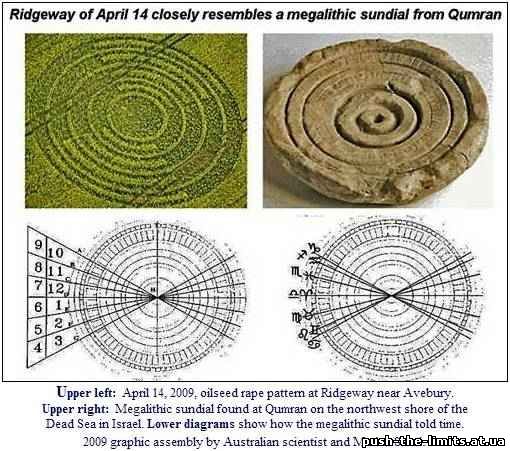
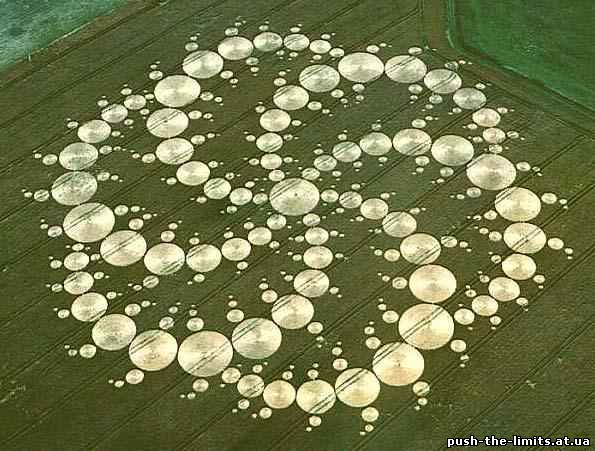

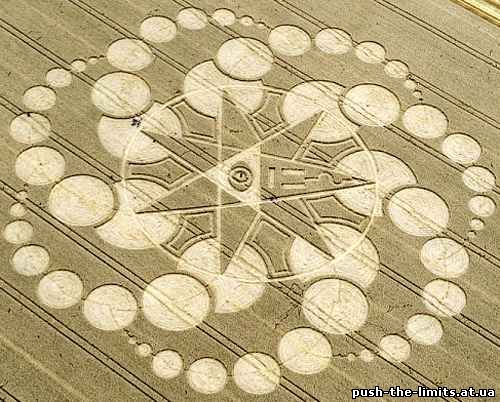
How to make a crop circle?
I
find it odd, to say the least, that people refuse to accept that crop
circles could be man made because of their complexity but are happy to
accept that it could be the work of aliens. http://www.circlemakers.org
supply some useful 'insider' information on their web site including how
long it took to make some of their crop circles. One formation made for
The Daily Mail was 300 feet across and made in 4.5 hours. Another was
200 feet across and made by three people in 2.5 hours, and yet another
was 218 feet across made in just 2 hours by only two people.It is also
interesting to note that Circle Makers say that it is easy to see that
crop circles are man made because of prominent construction lines that
underlie the paths of flattened crop that circlemakers use to lay out
the geometry of the design.Taking the opposing view that the crop
circles are not man made we have the web site
http://cropcircleconnector.com. This site tends to lean to the mystical
and spiritual aspect of crop circles, stressing how in the main they
appear around ancient sites such as Stonehenge, Avebury and Silbury
Hill, all in southern England. They say that "Crop circle researchers
are increasingly being asked to use creative and innovative thought as
part of their investigation process. Some current field research uses
meditation. lights and musical sounds in an effort to communicate new
patterns into the fields as the circles phenomenon has been seen to
interact with the human mind."
A very different approach to Circle Makers!
So, to sum up, what do we have?
1) We know crop circles first appeared in the UK following that silly Australia Saucer Nest story of 1966.
2) We know that crop circles were started in the UK by two pranksters, basing their idea on the Australia Saucer Nest story of 1966.
3) We know crop circle started with simple circles and gradually, with practice, progressed to more complex geometric shapes.
4) We know we have Circle Makers who regularly make crop circles.
5) We know it is a simple matter to make large, very complex circles in a few hours under cover of darkness.
6) We know that man made construction lines can be found under the circles.
7) We know that some of the photographs are fake.
What else do you need to know?
1) We know crop circles first appeared in the UK following that silly Australia Saucer Nest story of 1966.
2) We know that crop circles were started in the UK by two pranksters, basing their idea on the Australia Saucer Nest story of 1966.
3) We know crop circle started with simple circles and gradually, with practice, progressed to more complex geometric shapes.
4) We know we have Circle Makers who regularly make crop circles.
5) We know it is a simple matter to make large, very complex circles in a few hours under cover of darkness.
6) We know that man made construction lines can be found under the circles.
7) We know that some of the photographs are fake.
What else do you need to know?

